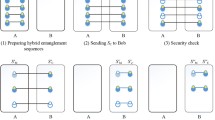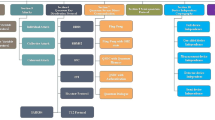Abstract
Key exchange is an important primitive protocol to establish and agree a shared session key between two legitimate users over a public channel. In this paper, we first review the parity properties of the characteristics of Bell states via entanglement swapping to form several interesting equations. Then we give a definition of verifiable quantum key exchange with authentication (VQKEA) and present a novel VQKEA protocol based on the parity properties of Bell states via entanglement swapping. Compared with most existing quantum key exchange protocols, our proposed protocol can meet more secure requirements, e.g., authentication, verifiability, fairness and forward secrecy. In addition, it is feasible to implement our proposed protocol with the present quantum processing technologies.




Similar content being viewed by others
References
Shor, P.W.: Algorithms for quantum computation: discrete logarithms and factoring. In Proc. 35th Annual Symposium on the Foundations of Computer Science, pp. 124–134, IEEE, New York (1994)
Grover, L.K.: A fast quantum mechanical algorithm for database search. In Proc. 28th Annual ACM Symposium on Theory of Computing, pp. 212–219, ACM, Philadelphia (1996)
Bennett, C.H., Brassard, G.: Quantum Cryptography: Public Key Distribution and Coin Tossing. In: Proc. IEEE International Conference on Computers, Systems, and Signal Processing, pp. 175–179, IEEE, Bangalore (1984)
Ekert, A.K.: Quantum Crypto Graphy bases on Bell’s theorem. Phys. Rev. Lett. 67(6), 661–664 (1991)
Bennett, C.H.: Quantum cryptography using any two non-orthogonal states. Phys. Rev. Lett. 68(21), 3121–3124 (1992)
Scarani, V., Acin, A., Ribordy, G., Gisin, N.: Quantum cryptography protocols robust against photon number splitting attacks for weak laser pulse implementations. Phys. Rev. Lett. 92, 057901 (2004)
Lo, H.K., Curty, M., Qi, B.: Measurement device independent quantum key distribution. Phys. Rev. Lett. 108, 130503 (2012)
Lucamarini, M., Yuan, Z.L., Dynes, J.F., Shields, A.J.: Overcoming the rate–distance limit of quantum key distribution without quantum repeaters. Nature. 557, 400–403 (2018)
Stinson, D.R.: Universal hashing and authentication codes. CRYPTO ‘91: Proceedings of the 11th Annual International Cryptology Conference on Advances in Cryptologypp. 74–85, Springer, Heidelberg (1992)
Barnum, H., Crepeau, C., Gottesman, D., Smith, A., Tapp, A.: Authentication of Quantum Messages. In: Chazelle B. (eds.) The 43rd Annual IEEE Symposium on the Foundations of Computer Science (FOCS’02), pp. 449–458, IEEE, Vancouver (2002)
Nagy, N., Akl, S.G.: Authenticated quantum key distribution without classical communication. Parallel Process. Lett. 17(03), 323–335 (2007)
Rass, S., König, S., Schauer, S.: BB84 quantum key distribution with intrinsic authentication. In: Privman, V. and Ovchinnikov, V. (eds.) ICQNM 2015, The Ninth International Conference on Quantum, Nano/Bio, and Micro Technologies, pp. 41–44, ThinkMind, Wilmington (2015)
Assis, F.M., Stojanovic, A., Mateus, P., Omar, Y.: Improving classical authentication over a Quantum Channel. Entropy. 14(12), 2531–2549 (2012)
Mosca, M., Stebila, D., Ustaoğlu, B.: Quantum key distribution in the classical authenticated key exchange framework. Proceedings of international workshop on post-quantum cryptography. Lect. Notes Comput. Sci. 7932, 136–154 (2013)
Kiktenko, E.O., Malyshev, A.O., Gavreev, M.A: Lightweight authentication for quantum key distribution. http://arxiv.org/pdf/1903.10237.pdf (2020) Accessed 23 September 2020
Zhou, N., Zeng, G., Xiong, J.: Quantum key agreement protocol. Electron. Lett. 40(18), 1149 (2004)
Shi, R.H., Zhong, H.: Multi-party quantum key agreement with bell states and bell measurements. Quantum Inf. Process. 12(2), 921–932 (2013)
Shen, D.S., Ma, W.P., Wang, L.L.: Two-party quantum key agreement with four-qubit cluster states. Quantum Inf. Process. 13(10), 2313–2324 (2014)
He, Y.F., Ma, W.P.: Quantum key agreement protocols with four-qubit cluster states. Quantum Inf. Process. 14(9), 3483–3498 (2015)
He, Y.F., Ma, W.P.: Two quantum key agreement protocols immune to collective noise. Int. J. Theor. Phys. 56(1), 328–338 (2017)
Liu, W.J., Chen, Z.Y., Ji, S., Wang, H.B., Zhang, J.: Multi-party semi-quantum key agreement with delegating quantum computation. Int. J. Theor. Phys. 56(10), 3164–2174 (2017)
Yang, Y.G., Gao, S., Li, D., et al.: Two-party quantum key agreement over a collective noisy channel. Quantum Inf. Process. 18(3), 74 (2019)
Yang, Y.G., Li, B.R., Li, D., et al.: New quantum key agreement protocols based on Bell states. Quantum Inf. Process. 18(10), 322 (2019)
Yan, L., Zhang, S., Chang, Y., Sheng, Z., Sun, Y.: Semi-quantum key agreement and private comparison protocols using bell states. Int. J. Theor. Phys. 58(11), 3852–3862 (2019)
Shi, R.H.: Useful equations about bell states and their applications to quantum secret sharing. IEEE Commun. Lett. 24(2), 386–390 (2020)
Acknowledgments
This work was supported by National Natural Science Foundation of China (No.61772001).
Author information
Authors and Affiliations
Corresponding author
Additional information
Publisher’s Note
Springer Nature remains neutral with regard to jurisdictional claims in published maps and institutional affiliations.
Rights and permissions
About this article
Cite this article
Shi, Rh., Liu, B. & Zhang, M. Verifiable Quantum Key Exchange with Authentication. Int J Theor Phys 60, 227–242 (2021). https://doi.org/10.1007/s10773-020-04681-0
Received:
Accepted:
Published:
Issue Date:
DOI: https://doi.org/10.1007/s10773-020-04681-0




